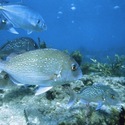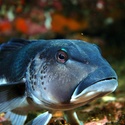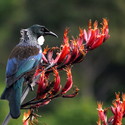Position: kairangahau1 Māori, consultant and trustee
Fields: Co-director Swamp Frog and Environmental Tree Consultants Ltd; National Wetland Trust (NZ)
Cheri van Schravendijk-Goodman (Te Atihaunui a Papārangi, Ngāti Apa, Ngāti Rangi) operates a whānau2 business and works as kairangahau Māori across many areas of interest.
Cheri worked as a policy advisor in areas of science and environmental planning and projects for Waikato Raupatu River Trust (under Waikato-Tainui Te Kauhanganui Inc) from 2008–2015. She has interests in environmental science (particularly ethnobotany, restoration and mātauranga3 pūtaiao), biosecurity4 and the training and development of iwi5 at the ‘flaxroots’.
Initially, Cheri dreamed of being either a veterinarian or a police officer – she loves the outdoors, animals and working with people. However, she got distracted during high school and ended up working in hospitality for 5 years. The vet dream lingered, and Cheri started taking maths and science papers at Hagley Community College in Christchurch. After a second veering off course, Cheri decided to study for a bachelor’s degree in resource studies (which later became the Bachelor of Environmental Management) at Lincoln University. That career path was one of the most important steps she took because it gave her a broad background in studies around social science, ecology6, biology7, physical sciences8/geology, water engineering, environmental economics, environmental policy and planning, resource management9 law and human ecology, and most importantly, it reconnected Cheri with the issues being faced by tangata whenua10 and their natural resources and the impacts of colonisation on their roles as environmental managers and decision-makers.
The best work is the most diverse work, and sometimes deviating off track can create the most innovative and exciting results.
During her years at university, Cheri had three children – so their playground was the lecture theatres of Lincoln University, the student whare Te Whakakotahi and the café (Mrs O’s!). The children gave Cheri a new appreciation for environmental work and caused her to think about what she could do to ensure them a good future. Cheri loved everything about the outdoors and was unsure about which direction to take until a mentor – Dr Jamie Ataria – helped her to realise that she loved plants (her mother was an avid gardener, and Cheri used to help her). Cheri did her master’s in ecology at the University of Canterbury studying a native11 weaving plant – the kiekie (Freycinetia banksii) – and working with amazing weavers from across the country. It was during that time that Cheri decided to work with tangata whenua12. The signing of the Agreement in Principle for the Waikato River Settlement between Waikato-Tainui and the government in December 2007 caught Cheri’s attention. She sought to work with Waikato-Tainui and landed a job with them in 2008, just as they were closing negotiations on the River Settlement.
Cheri’s position with the Waikato Raupatu River Trust was very diverse. One day, she could be at a negotiation table discussing matters of importance to Waikato – on other days, she was project managing research programmes. She could be part of a national focus group or network evaluating national policy issues of importance to tangata whenua13, or she was out working directly with marae around issues related to land management, environmental restoration and/or training and development needs.
Te Reo o Te Repo – The Voice of the Weland
Cheri is an editor of an online handbook series published by Manaaki Whenua – Landcare Research. These cultural wetland14 handbooks advocate the voices of our repo (wetlands) through the voices of the people. One area of particular interest is the ruru (morepork, Ninox novae-zelandiae) and its wetland connections.
Cheri's love of repo is taking a leap forward with the commencement of PhD15 work. Her kaupapa is climate change16 related, looking at past saline intrusion into old repo of Te Puuaha (the lower Waikato River).
Love of the outdoors
Cheri says the best days are when she’s out on the river with local tangata whenua and/or agencies, wading through mud at Whangamarino, monitoring birdlife or fish and planting trees.
When she’s not working, Cheri still loves being in the outdoors – spending time in the garden, experimenting with the placement of plants (native and exotic). Cheri loves natives and tries to squeeze as many of them as possible into her landscaping.
Cheri enjoys music – she used to play the saxophone but now settles for expanding her jazz and funk music collections.
Time Cheri spends with her mokopuna17, children and husband is precious – they are the key reason why she does what she does.
This article is based on information current in 2014 and updated in 2022.
Related content
Cheri is one of the editors of Te Reo o Te Repo – The Voice of the Wetland. Discover her work with ruru and other wetland species18.
- kairangahau: Researcher.
- whānau: Extended family.
- mātauranga: Māori cultural knowledge and understanding of the world; Māori wisdom.
- biosecurity: The process of preventing, detecting and controlling unwanted pests and diseases.
- iwi: Māori tribe or large community, often consisting of several hapū (clans) bound together by common ancestors.
- ecology: The study of the interactions of living organisms with each other and their environment.
- biology: The science of living things.
- physical sciences: The sciences that explore the study of inanimate natural objects, including physics, chemistry, astronomy and related subjects.
- resource management: Managing human impact on the environment in a way that is sustainable.
- tangata whenua: A Māori term that literally means ‘people of the land’, used to refer to Māori as the indigenous people of New Zealand.
- native: A species that lives naturally in a country, as opposed to species that have been introduced by the activity of humans.
- tangata whenua: A Māori term that literally means ‘people of the land’, used to refer to Māori as the indigenous people of New Zealand.
- whenua: Land.
- wetland: An area of land that is saturated with water, often referred to as a swamp or bog. Wetlands may be seasonally or permanently water-logged with vegetation adapted for life under those soil conditions. Wetlands are known as repo in te reo Māori.
- PhD: Abbreviation of Doctor of Philosophy – a degree normally obtained after a concentrated period of research. This is the highest level of degree that involves supervision by academic staff at a university.
- climate change: The large-scale, long-term increase in the Earth’s average temperatures, with associated changes in weather patterns. There is significant scientific evidence that warming is due to increased quantities of greenhouse gases in the atmosphere, with most of the rise due to human activity.
- mokopuna: Grandchild or young descendant.
- species: (Abbreviation sp. or spp.) A division used in the Linnean system of classification or taxonomy. A group of living organisms that can interbreed to produce viable offspring.









